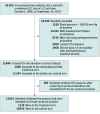Deprescribing of Antihypertensive Medications and Cognitive Function in Nursing Home Residents
- PMID: 39312220
- PMCID: PMC11420821
- DOI: 10.1001/jamainternmed.2024.4851
Deprescribing of Antihypertensive Medications and Cognitive Function in Nursing Home Residents
Abstract
Importance: Antihypertensive medication deprescribing is common among nursing home residents, yet its association with cognitive decline remains uncertain.
Objective: To investigate the association of deprescribing antihypertensive medication with changes in cognitive function in nursing home residents.
Design, setting, and participants: This cohort study using a target trial emulation approach included VA long-term care residents aged 65 years or older with stays of at least 12 weeks from 2006 to 2019. Residents who were not prescribed antihypertensive medication, with blood pressure greater than 160/90 mm Hg, or with heart failure were excluded. Eligible residents with stable medication use for 4 weeks were classified into deprescribing or stable user groups and followed for 2 years or until death or discharge for intention-to-treat (ITT) analysis. Participants switching treatment groups were censored in the per-protocol analysis. Cognitive function measurements during follow-up were analyzed using an ordinal generalized linear mixed model, adjusting for confounders with inverse probability of treatment weighting. Per-protocol analysis included inverse probability of censoring weighting. Data analyses were performed from May 1, 2023, and July 1, 2024.
Exposures: Deprescribing was defined as a reduction in the total number of antihypertensive medications or a decrease in medication dosage by 30%, sustained for a minimum of 2 weeks.
Main outcomes and measures: Cognitive Function Scale (CFS) was classified as cognitively intact (CFS = 1), mildly impaired (CFS = 2), moderately impaired (CFS = 3), and severely impaired (CFS = 4).
Results: Of 45 183 long-term care residents, 12 644 residents (mean [SD] age 77.7 [8.3] years; 329 [2.6%] females and 12 315 [97.4%] males) and 12 053 residents (mean [SD] age 77.7 [8.3] years; 314 [2.6%] females and 11 739 [97.4%] males) met eligibility for ITT and per-protocol analyses, respectively. At the end of the follow-up, 12.0% of residents had a worsened CFS (higher score) and 7.7% had an improved CFS (lower score) with 10.8% of the deprescribing group and 12.1% of the stable user group showing a worsened CFS score. In the per-protocol analysis, the deprescribing group had a 12% reduction in the odds of progressing to a worse CFS category per 12-week period (odds ratio, 0.88; 95% CI, 0.78-0.99) compared to the stable user group. Among residents with dementia, deprescribing was associated with 16% reduced odds of cognitive decline (odds ratio, 0.84; 95% CI, 0.72-0.98). These patterns remained consistent in the ITT analysis.
Conclusions and relevance: This cohort study indicates that deprescribing is associated with less cognitive decline in nursing home residents, particularly those with dementia. More data are needed to understand the benefits and harms of antihypertensive deprescribing to inform patient-centered medication management in nursing homes.
Conflict of interest statement
Figures


References
MeSH terms
Substances
Grants and funding
LinkOut - more resources
Full Text Sources
Medical
Miscellaneous

